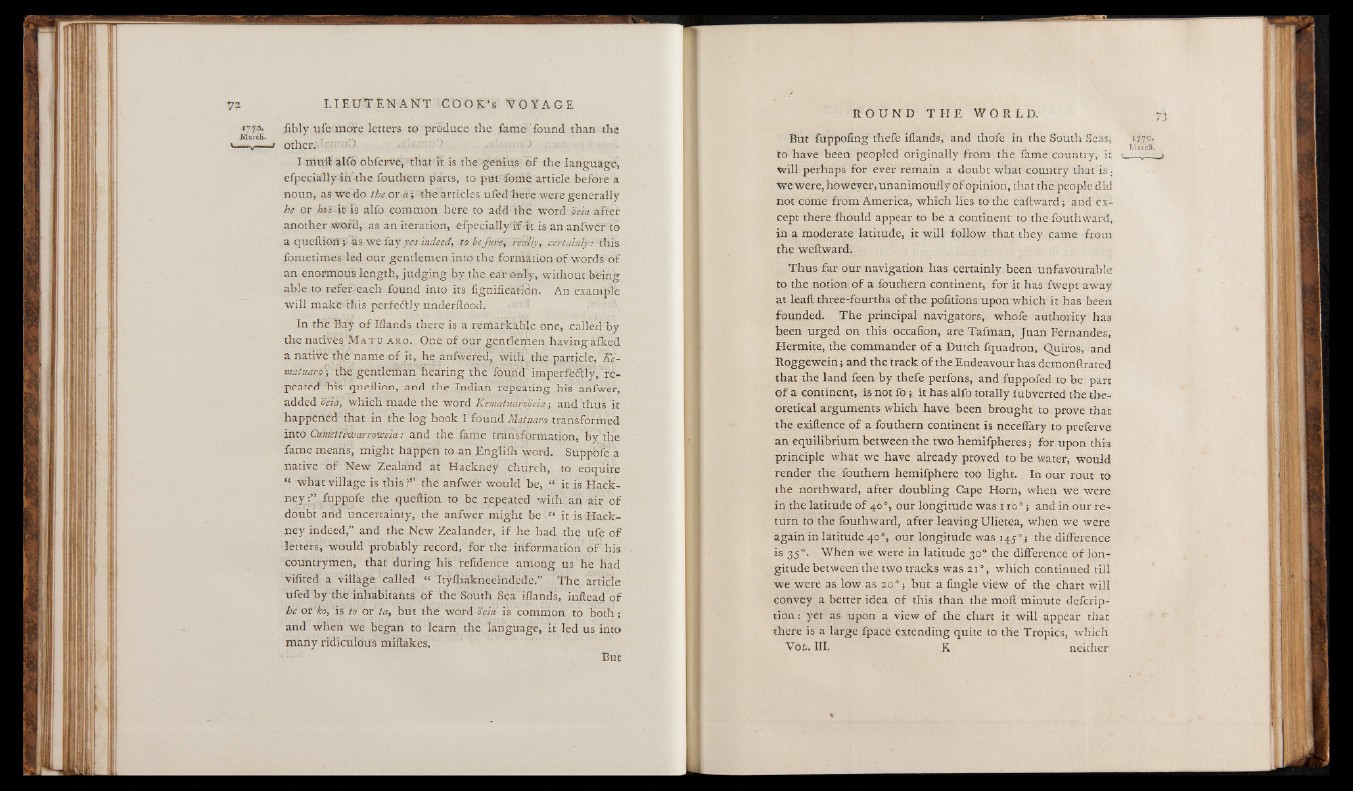
7?
n
L I E U T E N A N T CO O K ’S t O Y A G E
r770, fibly ufe more letters to produce the fame found than the
StariK. J '
— ,---> other." "fiinj
I mufi alfo obferve, that it is the genius of the language*
efpecially-ih-the fouthern parts, to put fome article before a
noun, as We do the or a ■, the articles ufedhere were generally
he or ^ 4uit-' is alfo common here to add the word 'beia after
another WhrH, as an iteration, efpecially'if' it is an anfwêrfto
a queftion ;■ -as we fay yes indeed, to be Jure, riMly, certainly: this
fometimes led our gentlemen into the formation o f words of
an enormous length, judging by the ear only, without being
able to refeneach found into its fignifica'tÖn. An example
will make this perfectly underltood.
In the Bay of Iflands there is a remarkable one, called by
the natives M a tu a r o . One of our gentlemen having afked
a nathrè' the name of it, he anfwered, with the particle, Ke-
matuaro-, the gentleman hearing the found imperfcdlly, repeated
his' queftion, and the Indian repeating his anfwer,
added öeia, which made the word Kematüdroöeia-, and thus it
happened that in the log book I found Matuaro. transformed
into Ctimetit’tvarro'weia: and the fame transformation, by'the
fame means; might happen to an Englifh word. Suppofe a
native' of New Zealand at Hackney church, to enquire
“ what village is this ?” the anfwer would be, “ it is Hackney
fuppofe the queftion to be repeated with an air of
doubt arid uncertainty, the anfwer might be “ it is Hackney
indeed,” and the New Zealander, if he had the ufe of
létters, would probably record, for the information of his
countrymen, that during his relidence among us he had
vifited a village called “ Ityfhakneeindede.” The . article
ufed by the inhabitants of the South Sea iflands, inftead of
he or'do, is to or ‘ta, but the word beid is common to both;
and when we began to learn the language, it led us into
many ridiculous miftakes.
But
But fuppofing thefe iflands, and thofe in the South Seas* i?7°-
to have been peopled originally from the fame country, it
will perhaps for ever remain a doubt what country that is.
We were, however, unanimoufly of opinion, that the people did
not come from America, which lies to the eaftward; and except
there fhould appear to be a continent to the fouthward,
in a moderate latitude, it will follow that they came from
the weftward.
Thus far our navigation has certainly been unfavourable
to the notion of a fouthern continent, for it has fwept away
at leaft three-fourths of the pofrtions upon which it has been
founded. The principal navigators, whofe authority has
been urged on this occafion, are Tafman, Juan Fernandes,
Hermite, the commander of a Dutch fquadron, Quiros, and
Roggewein; and the track of the Endeavour has demonftrated
that the land feen by thefe perfons, and fuppofed to be part
of a continent, is not fo ; it has alfo totally fubverted the theoretical
arguments which have been brought to prove that
the exiftence of a fouthern continent is necefiary to preferve
an equilibrium between the two hemifpheres; for upon this
principle what we have already proved to be water, would
render the fouthern hemifphere too light. In our rout to
the northward, after doubling Cape Horn, when we were
in the latitude of 40 °, our longitude was 1106; and in our re^
turn to the fouthward, after leaving Ulietea, when we were
again in latitude 40°, our longitude was 145°} the difference
is 35°. When we-were in latitude 30° the difference of longitude
between the two tracks was 21°, which continued till
we were as low as 20°, but a Angle view of the chart will
convey a better idea of this than the moft minute deferip-
tion: yet as upon a view of the chart it will appear that
there is a large fpace extending quite to the Tropics, which
Vol. III. K neither